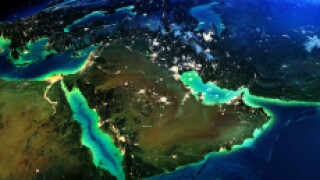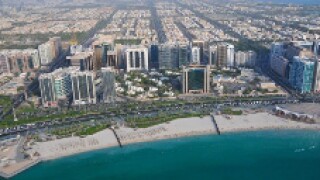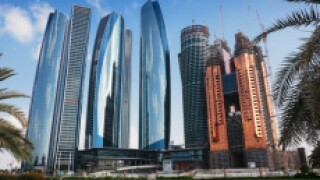GCC
-
Unrated issuer, Investment Corporation of Dubai is out with initial price thoughts of 4.15% area on a tap of its $300m 4.625% 2024 bonds, with analysts expecting a tightening of around 10bp in yield terms.
-
The United Arab Emirates’ banking system is expected to more than double its credit growth next year, compared with 2017, with stabilising oil prices and international bond issuance set to support funding in the country.
-
State-owned Abu Dhabi National Oil Co. (Adnoc) launched a $6bn debut syndicated loan this week after increasing the credit’s size and tightening pricing in response to banks’ hunger for it.
-
Two Middle Eastern sovereigns this week showed the depth and breadth investor demand for EM credit this week, one with a high quality jumbo $10bn trade, and the other, junk rated, with a bold 30 year trade that took full advantage of ideal funding conditions.
-
State-owned Abu Dhabi National Oil Co (Adnoc) has kicked off the syndication of its first syndicated loan for $6bn, after increasing its size and tightening pricing further in response to high demand for the facility.
-
Global Education Management Systems (GEMS) Education of Dubai is to launch a $1.2bn syndicated loan, ahead of its planned initial public offering early next year.
-
Middle Eastern banks are diversifying their funding portfolios by entering the international syndicated loan market for the first time, with Bahrain Islamic Bank (BisB) signing a deal at the end of September and two more due to sign this month.
-
Abu Dhabi was on track on Tuesday morning to print the second blowout trade from the Gulf in a week following Saudi Arabia's $12.5bn sale last Wednesday. It was also able to drive pricing through Saudi Arabia’s secondary curve, having taken orders of $30bn.
-
Shares in Hapag-Lloyd, the German container shipping line, are holding up well as the subscription period for its €352m rights issue begins.
-
Intercontinental Exchange (ICE), an operator of exchanges and clearing houses, on Monday announced clearing services for CDS referencing Saudi Arabia, as well as for a host of emerging market and Asia-Pacific corporate single names.
-
With some $27.5bn of orders going unallocated in the Saudi Arabia's order book last week, the market is awash with liquidity — much of which has a proven interest in the Gulf. Abu Dhabi has wasted no time in trying to build on Saudi’s success, opening books on its own triple tranche bond offer on Monday.









